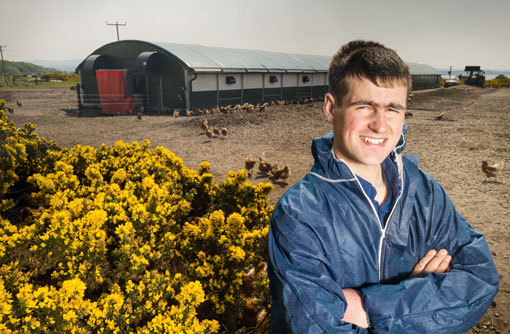Poultry Farmer Award shortlist: Gordon Whiteford

The finalists of the Poultry Farmer of the Year Award run three very different enterprises, covering organic eggs, intensive broilers and free-range chickens and turkeys. But they have one thing in common – they are all first-generation farmers who have built their businesses up from nothing.
Gordon Whiteford
Highland Eggs, Ardersier, Inverness
Gordon Whiteford is a young Scotsman who just won’t take no for an answer.
With farming in the blood, but no family farm to take over, he started off after college as a farm manager on a mixed organic unit near his home in Ardersier.
“I enjoyed this role, but my burning ambition was to run my own farm,” he says. Spotting a niche for organic eggs in a mainly arable area, he set about raising the £60,000 needed to put up his first unit.
His bank said no, and he was turned down for a diversification grant as he had not been in business for two years. But Gordon persevered and eventually secured a local enterprise grant for £25,000 and another £10,000 from the Prince’s Scottish Youth Business Trust.
The final chunk of £25,000 took the form of a personal loan, secured over the internet from the same bank that had previously turned him down.
The money was used to put up a mobile unit and the first flock of 3,000 pullets arrived in September 2005, with all eggs sold to Glenrath.
Expansion was always part of the plan and in 2008 the second shed went up, this time funded by the sale of a flat and the help of a 60% Scottish Rural Development Programme grant.
Gordon admits that he made mistakes – “putting pan feeders into our first shed was one of them” – and so he was determined to get it right with the second shed. “I looked hard for a better system and found it in Holland with Jansen.”
The multitier-type system has been instrumental to improved flock performance, with fitter, less aggressive birds. “I now expect a minimum 300 eggs per hen housed at 72 weeks and mortality below breed target.”
As well as achieving a strong physical performance from his organic hens, Gordon has also achieved a strong financial performance. His 12-month margin after feed and pullets exceeds £13 a bird, roughly double the sector average. “Some people farm organically for idealistic reasons,” he says. “For me it is a business and that’s what drives me.”
Much of his success derives from Gordon’s proactive and flexible approach to marketing.
This was triggered by the loss of the Glenrath contract in 2010, as organic egg sales plummeted nationally. “I decided to pack my own eggs and stick with organic as a point of difference.”
Taking over a cage-egg round further north, Gordon converted all the customers to free-range and organic, putting up prices by 20p/doz without losing a single buyer.
He has also developed a strong customer base for organic eggs among top local hotels and restaurants, and has developed his own Highland Eggs brand to capture a premium from retail customers.
“We have a stylish new box which we use primarily for our large eggs, sold through butchers, delis and farm shops.”
As well as branding, Gordon has concentrated on getting his name out and about by supporting local events and hosting farm visits. He uses Facebook and Twitter to build relationships with customers and has spoken on local radio and at the Rotary Youth Leadership Awards.
Gordon is optimistic that the organic market will bounce back. “I’m more concerned about the free-range sector than I am about the organic sector,” he says. “The current good run of prices is very short term and cage egg supplies will increase again.”
He also predicts a backlash against the increasing scale and intensification of free-range egg production. “Organic is what most people actually think of as free range.”
When the economy picks up, Gordon believes consumers will start buying more organic, regardless of the cost premium. And with his Highland Egg brand, he believes he will be part of the renaissance.
“No one else is branding organic eggs at the moment. But I know that branding works and I want to be the one who is pushing it,” he says.
A word from our sponsor
 “NatWest has been supporting UK agriculture for more than 200 yeards and following my recent visits to the three finalists for the Poultry Farmer of the Year awards, I continue to be encouraged by their enthusiasm and innovation.”
“NatWest has been supporting UK agriculture for more than 200 yeards and following my recent visits to the three finalists for the Poultry Farmer of the Year awards, I continue to be encouraged by their enthusiasm and innovation.”
Ian Burrow, head of agriculture and renerwable energy Natwest
See more
Meet the other 2012 finalists
Find out more about the 2012 Farmers Weekly Awards including details on how to books tables for the event’s glittering London awards bash
